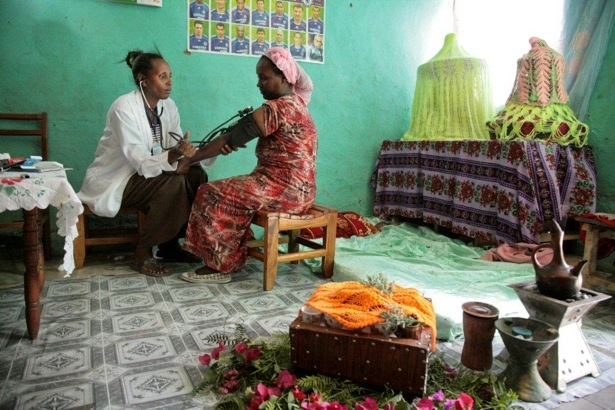Frontline Health Workers Are Key to Meeting Family Planning Needs Worldwide

By: Oying Rimon, Bill & Melinda Gates Foundation
Around the world, frontline health workers are often the first link to lifesaving care and supplies, and in some cases they are the only link for families and communities in rural and impoverished areas. This is also where most of the world’s unmet need for family planning resides. More than 200 million women in developing countries want to delay or avoid pregnancy but lack access to modern methods of contraception.
Family planning and frontline health workers: worth the investment
In just a few short weeks, the foundation, together with the UK government and other partners, will host the London Summit on Family Planning. It will be a groundbreaking global convening of developed and developing country government and civil society leaders, who will pledge to address the contraceptive needs of an additional 120 million women in the world’s poorest countries by 2020. The summit will also focus on tackling cultural barriers to contraception and encourage countries to adopt a rights-based approach, which enables women to decide whether, when, and how many children to have. At the foundation, we often talk about how frontline health workers and family planning are extremely cost-effective strategies to save lives, and improve health and development broadly. For instance, every three seconds a child’s life is saved thanks to the care provided by a frontline worker (PDF), who can be provided basic training for as little as $300 (U.S.). Likewise, investing in family planning services has a proven cost-benefit return for both developing and developed country governments, and addressing current unmet contraceptive need could prevent one in three maternal deaths and one in four infant deaths.
A personal connection
For me, frontline health workers are not just a smart investment, but also a community I feel personally committed to. Back in the 1970s, one of my first jobs was as manager of a national family planning program in my native country of the Philippines, which included more than 4,500 outreach workers and 50,000 community-based volunteers providing information and services to couples in their neighborhoods. I met with many of these highly committed community-based workers and saw first-hand how crucial a role they played for the country’s population, nearly half of which resides in urban slums.
In the Philippines, this first-string of health providers, mostly midwives and barangay (village) health workers, fills the gaps of an overwhelmed healthcare system and provides critical health. As of 2012, contraception use in the country, which is 80 percent Catholic, is just 34 percent. Yet current political leadership is committed to bringing family planning services closer to the people. Recently, I was on a personal visit there and was pleasantly surprised to see many of the same individuals I used to know, still working for their communities–although many now qualify for senior citizen discounts!
Progress is possible
In other parts of the world, frontline workers are already doing more to provide family planning services to the poor and marginalized. For example, in Uganda, recent policy changes allow community health workers to provide injectable contraceptives to women, and have resulted in significant improvements in contraceptive access countrywide (PDF).
Frontline workers have the ability to reach those most in-need. We know that progress is possible. Yet in order to see results, frontline workers need to be adequately trained, supported, and integrated into the broader health system, and they need consistent access to cost-effective family planning supplies. Imagine the impact if we worked to prioritize policies like task shifting and training that enable frontline workers to deliver family planning services to meet the needs of millions?
The London Summit on Family Planning will aim to galvanize new financial and political commitments to ensure this progress, and convene leaders to affirm that every woman in the world deserves the opportunity to determine her own future. With the right resources and policy support, I believe there are few limits to what frontline workers can do. Empowering them with family planning knowledge and supplies, which they can deliver to women worldwide, will have an immediate and far-reaching impact. Doing so will benefit not just women themselves, but families, communities, and entire nations.
Frontline Health Workers Are Key to Meeting Family Planning Needs Worldwide’ is also featured on the Bill and Melinda Gates Foundation blog "Impatient Optimists." You can view the post here.
Written by: Oying Rimon, Bill & Melinda Gates Foundation. The Bill & Melinda Gates Foundation is a member of the Frontline Health Workers Coalition, a dynamic and influential coalition of 25+ NGOs working together to urge greater and more strategic U.S. investment in frontline health workers in the developing world as the most cost-effective way to save lives and foster a healthier, safer and more prosperous world.

